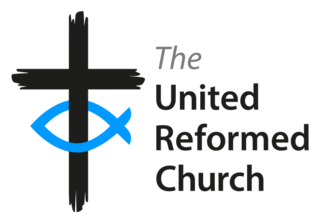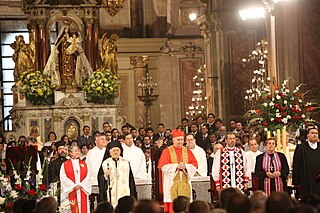Related Research Articles

Churches Uniting in Christ (CUIC) is an ecumenical organization that brings together mainline American denominations, and was inaugurated on January 20, 2002 in Memphis, Tennessee on the balcony of the Lorraine Motel. It is the successor organization to the Consultation on Church Union.

The World Council of Churches (WCC) is a worldwide Christian inter-church organization founded in 1948 to work for the cause of ecumenism. Its full members today include the Assyrian Church of the East, the Oriental Orthodox Churches, most jurisdictions of the Eastern Orthodox Church, the Old Catholic Church, the Lutheran Churches, the Anglican Communion, the Mennonite Churches, the Methodist Churches, the Moravian Church, Mar Thoma Syrian Church and the Reformed Churches, as well as the Baptist World Alliance and Pentecostal Churches. Notably, the Catholic Church is not a full member, although it sends delegates to meetings who have observer status. The WCC arose out of the ecumenical movement and has as its basis the following statement:
The World Council of Churches is a fellowship of churches which confess the Lord Jesus Christ as God and Savior according to the scriptures, and therefore seek to fulfill together their common calling to the glory of the one God: Father, Son and Holy Spirit.
It is a community of churches on the way to visible unity in one faith and one eucharistic fellowship, expressed in worship and in common life in Christ. It seeks to advance towards this unity, as Jesus prayed for his followers, "so that the world may believe".
Full communion is a communion or relationship of full agreement among different Christian denominations that share certain essential principles of Christian theology. Views vary among denominations on exactly what constitutes full communion, but typically when two or more denominations are in full communion it enables services and celebrations, such as the Eucharist, to be shared among congregants or clergy of any of them with the full approval of each.

Ecumenism, also spelled oecumenism, is the concept and principle that Christians who belong to different Christian denominations should work together to develop closer relationships among their churches and promote Christian unity. The adjective ecumenical is thus applied to any interdenominational initiative that encourages greater cooperation among Christians and among their churches.

The United Reformed Church (URC) is a Protestant Christian church in the United Kingdom. As of 2022 it has approximately 40,000 members in 1,284 congregations with 334 stipendiary ministers

In Anglican Christianity, low church refers to those who give little emphasis to ritual. The term is most often used in a liturgical sense, denoting a Protestant emphasis, whereas "high church" denotes an emphasis on ritual, often Anglo-Catholic.

The Consultation on Church Union (COCU) was an effort towards church unity in the United States, that began in 1962 and in 2002 became the Churches Uniting in Christ. It was a significant part of the Christian movement towards ecumenism. This effort can be seen in the context of the worldwide ecumenical attitude that was manifested in the 1948 formation of the World Council of Churches, the 1950 formation of the National Council of Churches, the 1957 formation of the United Church of Christ, and the formation of the Roman Catholic Pontifical Council for Promoting Christian Unity during the Second Vatican Council. The original task of COCU was to negotiate a consensus between its member denominations.

A united church, also called a uniting church, is a church formed from the merger or other form of church union of two or more different Protestant Christian denominations.

The Moravian Church, or the Moravian Brethren, formally the Unitas Fratrum, is one of the oldest Protestant denominations in Christianity, dating back to the Bohemian Reformation of the 15th century and the Unity of the Brethren founded in the Kingdom of Bohemia, sixty years before Luther's Reformation.

In England and Wales, a local ecumenical partnership is a partnership between churches of different denominations. First piloted in 1964, over 850 now exist to promote unity between different Christian denominations.

The Week of Prayer for Christian Unity is an ecumenical Christian observance in the Christian calendar that is celebrated internationally. It is kept annually between Ascension Day and Pentecost in the Southern Hemisphere and between 18 January and 25 January in the Northern Hemisphere. It is an octave, that is, an observance lasting eight days.

Catholic charismatic renewal is a movement within the Catholic Church that is part of the wider charismatic movement across historic Christian churches. It has been described as a "current of grace". It began in 1967 when Catholics from Duquesne University attended a Protestant worship service and claimed to have been "baptized in the Holy Spirit". It is heavily influenced by American Protestantism, especially Pentecostalism, with an emphasis on having a "personal relationship with Jesus", deep emotional experiences, and expressing the "gifts of the Holy Spirit".
The Federal Council of Churches, officially the Federal Council of Churches of Christ in America, was an ecumenical association of Christian denominations in the United States in the early twentieth century. It represented the Anglican, Baptist, Eastern Orthodox, Lutheran, Methodist, Moravian, Oriental Orthodox, Polish National Catholic, Presbyterian, and Reformed traditions of Christianity. It merged with other ecumenical bodies in 1950 to form the present day National Council of Churches.

The Catholic Church has engaged in the modern ecumenical movement especially since the Second Vatican Council (1962-1965) and the issuing of the decree Unitatis redintegratio and the declaration Dignitatis humanae. It was at the Council that the Pontifical Council for Promoting Christian Unity was created. Those outside of the Catholic Church were categorised as heretics or schismatics, but in many contexts today, in order to avoid offence, the euphemism "separated brethren" is used.

The historic or historical episcopate comprises all episcopates, that is, it is the collective body of all the bishops of a church who are in valid apostolic succession. This succession is transmitted from each bishop to their successors by the rite of Holy Orders. It is sometimes subject of episcopal genealogy.

Anglican interest in ecumenical dialogue can be traced back to the time of the Reformation and dialogues with both Orthodox and Lutheran churches in the sixteenth century. In the nineteenth century, with the rise of the Oxford Movement, there arose greater concern for reunion of the churches of "Catholic confession". This desire to work towards full communion with other denominations led to the development of the Chicago-Lambeth Quadrilateral, approved by the Third Lambeth Conference of 1888. The four points were stipulated as the basis for church unity, "a basis on which approach may be by God's blessing made towards Home Reunion":

The Moravian Church of the British Province is part of the worldwide Moravian Church Unity.
The Fellowship of Middle East Evangelical Churches (FMEEC) is an ecumenical organisation comprising Protestant churches in the Middle East with representatives from Sudan to Iran. Established in 1974, the current president of the FMEEC is the Rev Dr Andrea Zaki.
A covenant was signed in 1975 between the Church in Wales, the Methodist Church of Great Britain, the Presbyterian Church of Wales (PCW), the United Reformed Church (URC) and some covenanted Baptist churches. These Covenanted Churches work together on issues of faith and worship and are pledged to ever-closer ecumenical cooperation. The Commission of the Covenanted Churches is committed to the "development of new ecumenical congregations and churches", and the "preparation of agreed liturgies for communion and baptism". Proposals in the early 2000s for the creation of an "Ecumenical Bishop" were rejected by the smaller denominations. The Covenanted Churches are also members of Cytûn.
Protestant theology refers to the doctrines held by various Protestant traditions, which share some things in common but differ in others. In general, Protestant theology, as a subset of Christian theology, holds to faith in the Christian Bible, the Holy Trinity, salvation, sanctification, charity, evangelism, and the four last things.
References
- 1 2 Thompson, David M.; Briggs, John H. Y.; Turner, John Munsey (5 February 2015). Protestant Nonconformist Texts Volume 4: The Twentieth Century. Wipf and Stock Publishers. ISBN 9781498219181 – via Google Books.
- ↑ The Rev Caryl Micklem: Obituary in The Independent, 18 June 2003
- ↑ https://moodle.urc.org.uk/mod/resource/view.php?id=2604 [ dead link ]
- ↑ THE STORY OF THE BCC. Notes by Colin Davey
- ↑ "Archived copy" (PDF). Archived from the original (PDF) on 2019-10-10. Retrieved 2019-10-10.
{{cite web}}: CS1 maint: archived copy as title (link) - ↑ Tony Tucker (2003). Reformed Ministry: Traditions of Ministry and Ordination in the United Reformed Church. ISBN 978-0853462170
- ↑ Camroux, Martin (27 May 2016). Ecumenism in Retreat: How the United Reformed Church Failed to Break the Mould. Wipf and Stock Publishers. ISBN 9781498234009 – via Google Books.